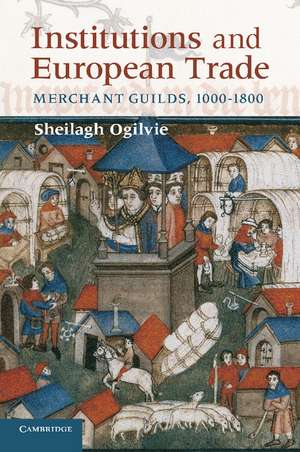Institutions and European Trade: Merchant Guilds, 1000–1800: Cambridge Studies in Economic History - Second Series
Autor Sheilagh Ogilvieen Limba Engleză Paperback – 16 mar 2011
| Toate formatele și edițiile | Preț | Express |
|---|---|---|
| Paperback (1) | 241.94 lei 6-8 săpt. | |
| Cambridge University Press – 16 mar 2011 | 241.94 lei 6-8 săpt. | |
| Hardback (1) | 712.69 lei 6-8 săpt. | |
| Cambridge University Press – 16 mar 2011 | 712.69 lei 6-8 săpt. |
Din seria Cambridge Studies in Economic History - Second Series
-
 Preț: 269.82 lei
Preț: 269.82 lei -
 Preț: 236.86 lei
Preț: 236.86 lei -
 Preț: 285.37 lei
Preț: 285.37 lei -
 Preț: 316.69 lei
Preț: 316.69 lei -
 Preț: 193.14 lei
Preț: 193.14 lei -
 Preț: 431.40 lei
Preț: 431.40 lei -
 Preț: 398.32 lei
Preț: 398.32 lei -
 Preț: 370.60 lei
Preț: 370.60 lei -
 Preț: 366.03 lei
Preț: 366.03 lei -
 Preț: 373.32 lei
Preț: 373.32 lei -
 Preț: 348.26 lei
Preț: 348.26 lei -
 Preț: 360.39 lei
Preț: 360.39 lei -
 Preț: 312.84 lei
Preț: 312.84 lei -
 Preț: 240.69 lei
Preț: 240.69 lei - 14%
 Preț: 758.86 lei
Preț: 758.86 lei -
 Preț: 284.39 lei
Preț: 284.39 lei - 11%
 Preț: 694.23 lei
Preț: 694.23 lei -
 Preț: 237.75 lei
Preț: 237.75 lei -
 Preț: 287.28 lei
Preț: 287.28 lei -
 Preț: 308.60 lei
Preț: 308.60 lei -
 Preț: 206.39 lei
Preț: 206.39 lei - 11%
 Preț: 587.49 lei
Preț: 587.49 lei - 11%
 Preț: 637.54 lei
Preț: 637.54 lei - 9%
 Preț: 593.57 lei
Preț: 593.57 lei
Preț: 241.94 lei
Nou
Puncte Express: 363
Preț estimativ în valută:
46.30€ • 48.46$ • 38.53£
46.30€ • 48.46$ • 38.53£
Carte tipărită la comandă
Livrare economică 31 martie-14 aprilie
Preluare comenzi: 021 569.72.76
Specificații
ISBN-13: 9780521747929
ISBN-10: 0521747929
Pagini: 500
Dimensiuni: 152 x 226 x 23 mm
Greutate: 0.79 kg
Editura: Cambridge University Press
Colecția Cambridge University Press
Seria Cambridge Studies in Economic History - Second Series
Locul publicării:Cambridge, United Kingdom
ISBN-10: 0521747929
Pagini: 500
Dimensiuni: 152 x 226 x 23 mm
Greutate: 0.79 kg
Editura: Cambridge University Press
Colecția Cambridge University Press
Seria Cambridge Studies in Economic History - Second Series
Locul publicării:Cambridge, United Kingdom
Cuprins
1. Merchant guilds, efficiency, and social capital; 2. What was a merchant guild?; 3. Local merchant guilds; 4. Alien merchant guilds and companies; 5. Merchant guilds and rulers; 6. Commercial security; 7. Contract enforcement; 8. Principal-agent problems; 9. Information; 10. Price volatility; 11. Institutions, social capital and economic development.
Recenzii
'Sheilagh Ogilvie shows yet again the brilliant scientific results to be achieved from combining an economist's clarity of mind with a historian's respect for how it actually was. She demolishes the Panglossian story put forward by the New Institutionalists, reminding us that for guilds as for manors and taxes and trade a proud power could trump efficiency. Elegantly written, decisively argued, her book is an instant classic.' Deirdre McCloskey, University of Illinois, Chicago
'This book will make it impossible for anyone ever to argue again that merchant guilds were beneficial to society just because they produced benefits for their own members. Ogilvie's magisterial analysis of their complex social impact will change radically the way we think about not only guilds themselves but about institutions, social capital and economic development from the Middle Ages right up to our own day.' Paul Seabright, Toulouse School of Economics
'In this tour de force, Ogilvie upends the current scholarly consensus that merchant guilds were institutions whose economic and cultural qualities promoted economic development and social solidarity. By examining large numbers of these guilds and their vast historical literature, she demonstrates instead that they were monopolies, rent-seeking institutions that continued to exist as long as they served to distribute a disproportionate share of economic goods to their members and their rulers.' Thomas Max Safley, University of Pennsylvania
'… this is a very important book that gives rise to a number of highly significant questions for future research.' Reviews in History (history.ac.uk/reviews)
'Ogilvie's conclusion has profound implications for the study of economic institutions, and that is what makes this an important book - one might even call it a game-changer.' EH-Net (EH.net)
'This book not only effectively demolishes the efficiency thesis regarding merchant guilds, but, more importantly, also provides a framework for analysing institutional change, and it will define the terms of how social institutions should be researched and evaluated for years to come.' Economic History Review
'This book will make it impossible for anyone ever to argue again that merchant guilds were beneficial to society just because they produced benefits for their own members. Ogilvie's magisterial analysis of their complex social impact will change radically the way we think about not only guilds themselves but about institutions, social capital and economic development from the Middle Ages right up to our own day.' Paul Seabright, Toulouse School of Economics
'In this tour de force, Ogilvie upends the current scholarly consensus that merchant guilds were institutions whose economic and cultural qualities promoted economic development and social solidarity. By examining large numbers of these guilds and their vast historical literature, she demonstrates instead that they were monopolies, rent-seeking institutions that continued to exist as long as they served to distribute a disproportionate share of economic goods to their members and their rulers.' Thomas Max Safley, University of Pennsylvania
'… this is a very important book that gives rise to a number of highly significant questions for future research.' Reviews in History (history.ac.uk/reviews)
'Ogilvie's conclusion has profound implications for the study of economic institutions, and that is what makes this an important book - one might even call it a game-changer.' EH-Net (EH.net)
'This book not only effectively demolishes the efficiency thesis regarding merchant guilds, but, more importantly, also provides a framework for analysing institutional change, and it will define the terms of how social institutions should be researched and evaluated for years to come.' Economic History Review
Notă biografică
Descriere
A magisterial new history of commercial institutions developed through the study of merchant guilds.









